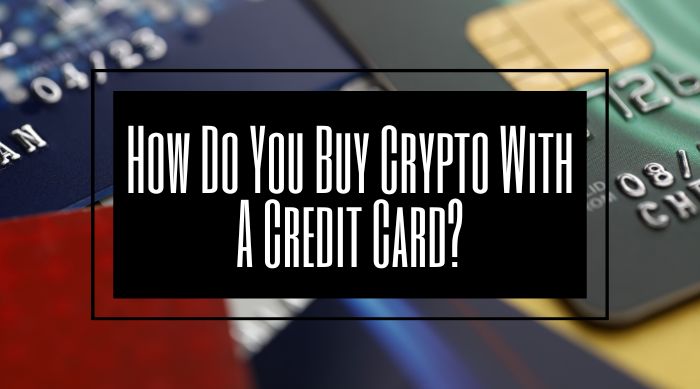Many newcomers to cryptocurrency have the same question; how do you buy crypto with a credit card? The shortest answer to that question is that it depends on whether the exchange you want to use accepts them, whether your credit card issuer allows it, and how much the transaction will cost you.
Technically it is possible to buy crypto with a credit card, but it is not as “universally possible” as withdrawing U.S. dollars from an ATM machine. And it’s also not necessarily a good idea to buy crypto with a credit card, as we’ll explore below.
How Do You Buy Crypto With A Credit Card?

The key to getting started buying crypto with a credit card is to check your card. Do the terms of service prohibit doing so? If not, you can proceed to checking with the exchange or platform you wish to use. If they do not accept a credit card, you’ll have to shop around for one that does.
It’s crucial to remember the differences between a credit card and a debit card. That sounds like a fairly obvious thing, but there are multiple reasons to be a bit extra mindful in this department. For example, buying cryptocurrency with a credit card may be viewed as a cash advance and charged interest and fees accordingly.
For those who don’t know, finding out about those fees the hard way brings some “sticker shock” over the higher fees and rates typically charged for credit card cash advances.
And when it comes to the actual permission to buy crypto with a card, exchanges like Coinbase have terms of service that permit the purchase of crypto using a Visa or Mastercard debit card but NOT Visa or Mastercard credit cards.
Prepaid Cards, Gift Cards, KYC
Coinbase in particular does not, at press time, support prepaid cards, cards without a billing address, or credit cards. Such “no-address” options don’t provide much in the way of Know Your Customer protections for the exchange, and that’s important to consider when deciding on a service to use.
Do you feel comfortable buying crypto with a credit card when there are no KYC protocols to protect you?
When you sign up at Coinbase, you are subject to Know Your Customer verifications including verifying your debit card with small credits and debits to your account which must be acknowledged by you before you can start using certain Coinbase features.
Continuing our examination of Coinbase as a thought-leader in this area, it’s also important to know that while the exchange may have supported the use of credit cards in the past, Coinbase says it “no longer supports” them.
And credit cards that were previously supported? Some of those card issuers may now refuse to approve crypto purchases.
Buying Crypto With A Credit Card: Fees
It’s a terrible idea to buy crypto with a credit card for a variety of fee-related reasons. Exchange fees are one of them. You may be subject to the usual fees for purchasing crypto but also an added percentage.
Coinmama, an exchange that permits the purchase of crypto using a credit card, tacks on an additional five percent “momentum fee”.
Before you can pay this fee, you are subject to Know Your Customer verifications, which in this case require you to upload a passport, national ID card or other identifying documents. Once you have met the KYC requirements you are allowed to purchase Bitcoin up to a $15,000 limit on your credit or debit card.
Credit Card Issuer Fees
And don’t forget the credit card issuer may charge you a cash advance fee or cash advance interest on top of that. Your purchase will incur fees from many different sources when buying with a credit card.
That could run between 3% and 8% of the purchase and you may not have the same grace period for repayment that non-cash advance transactions offer. You may be subject to lower credit limits for cash advances and crypto purchases may not qualify for the usual customer rewards options.
If your credit card issuer treats a crypto purchase like a cash advance, remember that among financial blogs and credit experts such advances are not recommended in general due to the factors listed above.
Interest Rates
We’ve already discussed how interest rates on crypto purchases on a credit card might be higher than usual. But what about the notion of paying interest on a purchase that doesn’t keep its value?
We aren’t talking in this context about the type of investment like a house that fluctuates in value over time but essentially maintains a baseline. It’s one thing to experience a housing market in a cycle of decline, but it’s quite another to pay interest on an investment that has the potential to drop from $60K or more in value to…zero.
Will Bitcoin ever reach zero? It’s entirely possible given the right conditions. And that’s the difference between paying interest on a mortgage where values can rise and fall within a certain range.
If your home loses value, you can still live in it and use the property as you see fit. If Bitcoin loses value, you don’t have any utility to show for your purchase on the credit card. AND you are still paying every month for a purchase that has lost more value than what you paid for it, in such cases.
Credit Cards And Crypto: Pundits Say No?
Newcomers to crypto are sometimes ALSO newcomers to investing. It pays to read the advice of traditional investors when it comes to paying for investments using a loan, credit card, or other credit. Even some of the shadiest and least-reliable financial pundits say using credit cards is a bad idea in general, let alone for investing.
Dave Ramsey admonishes his readers never to use one. “You do not need a credit card. Nope, not one, not two, not three. And not even for emergencies.” And while that assertion likely comes from a position of extreme privilege, when it comes to investing in crypto the “no credit cards” advice is actually sound.
Using A Credit Card To Get Crypto
If you want to use a credit card to obtain cryptocurrency, you can use some cards to earn it instead of buying. Granted, it’s a longer process and you likely won’t rely on this method alone to obtain more coins, but it’s a good start for a newcomer.
Did you know there are traditional credit cards now offering crypto rewards? Here’s a list of a few of those which currently or in the past have offered crypto rewards in addition to other perks like frequent flyer miles:
- Brex Card
- SoFi Credit Card
- Venmo Credit Card
- BlockFi Rewards Visa
- Gemini Credit Card
- Upgrade Bitcoin Rewards
The caveats for these cards mentioned above all apply. It will be important to check the terms and conditions for both the rewards programs as well as for ordinary purchases.
It might be tempting to believe that because these cards pay rewards in crypto that they also allow you to buy Bitcoin or other currencies without the usual extra fees. That is a very bad assumption to make.
In fact, you may find that some cards associated with crypto have very specific rules for using them in crypto transactions. You’ll want to know all the fine print, including under what conditions crypto rewards may be forfeited or subject to additional taxes or penalties.
Other Things To Worry About When Buying Crypto With A Credit Card
At press time, there is little U.S. government regulation on cryptocurrencies. There is exponentially more regulation on credit cards and investments. This is why it’s a good idea to study more traditional investing law when exploring your crypto options.
When you buy with a credit card, you aren’t taxed by the IRS as though you were getting income. But a crypto gain or loss that triggers what the IRS calls a “taxable event” can happen when you make a gain in your crypto investments and cash them out.
The IRS requires you to report such gains or any appropriate loss. Borrowing money (a cash advance to buy crypto for example) is not considered to be equivalent to earning it–you have to repay the money back. But when you buy cryptocurrency and sell it, that can be a taxable event if you make a profit.
So taking out the loan to buy your investment doesn’t get taxed, but the results of your (crypto) purchase might. Remember that at press time IRS rules say simply owning crypto is not necessarily a taxable event. But you will need the advice of a tax pro or an IRS rep to learn what your current options might be going forward.
The closer you get to traditional finance, and that includes borrowing money to leverage an investment, the closer you get to government regulation. Ignorance of those regulations will NOT PROTECT YOU if you are fined, audited, or investigated by the IRS or other entities.
Joe Wallace has covered real estate and financial topics, including crypto and NFTs since 1995. His work has appeared on Veteran.com, The Pentagon Channel, ABC and many print and online publications. Joe is a 13-year veteran of the United States Air Force and a former reporter for Air Force Television News.


